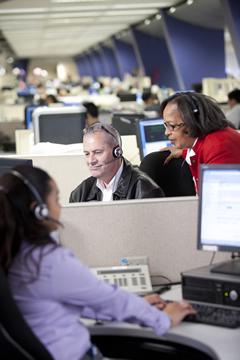Enhancing Stakeholder Relationships

As the operator of an extensive energy-distribution infrastructure in one of the world’s most densely-populated corridors, Con Edison has a large group of stakeholders that includes customers, employees, environmental groups, shareholders, elected officials, regulators, and communities where we do business. The company actively participates in an ongoing engagement with its stakeholders to keep them informed, exchange information, find common ground on issues of mutual concern, and partner in the cultural and civic vitality of the region.
One of the most important stakeholder groups Con Edison has is its utility customers. To enhance customer relationships, Con Edison assembled a cross-organizational team to develop a proactive, customer-centric culture, to foster trust and confidence among customers, and to improve value for all stakeholders. We recognize the importance of the customer to our business and want to ensure that we align our systems and employees to meet our customers’ needs and expectations.
Con Edison also uses Twitter and Facebook as additional communication channels for those employees, customers, and members of the public looking to find quick updates on general service issues or emergency response work. Proactive communication is a priority for enhancing customer relationships, and in addition to our Twitter feed and Facebook page, we round out communications using outbound calls and e-mails.
Outbound calls were made primarily during the summer months, and in particular during heat events, to administer demand-response programs and alert customers to voltage reductions in their neighborhoods. These calls are a way for us to reach customers and keep them informed of changing situations, the needs of our system, and the importance of the role they play in keeping our system going in these high-load situations.
We also have over a million e-mail addresses for customers throughout the Con Edison service territory. We used those to deliver e-mail communications throughout the year, such as during heat events when we told customers how to conserve energy and gave tips on staying safe and healthy in the sweltering heat. In connection with storms, e-mail communications were sent out giving safety tips for stormy weather and reminding customers of the ways they can report outages. In addition, e-mail communications are also used to inform customers about opportunities to improve efficiency and conserve energy. Though e-mails don’t reach every one of our customers, we believe they are a good way of communicating important information to large audiences. We are looking to expand the program in the coming year to include announcements for planned routine work, emergency work, and tree-trimming. Customers can sign up to receive these e-mails by providing their preferred address at conEd.com, or by calling 1-800-75-CONED.
Con Edison’s standard for communications with external customers requires that any letter or e-mail sent includes the sender’s name and phone number. This is to ensure that the customer has a direct line of communication in order to address any subsequent issues or concerns.
While we’re working on communicating better with our customers, we also know the importance of what we can learn when the customer communicates with us. We closely analyze the data provided through our bi-annual customer surveys. This data is helping us to identify areas for improvement as well as highlight areas where we know we’re serving the customer well. To supplement this source of information, Con Edison also uses customer focus groups, e-mail surveys, and phone satisfaction ratings. We know the best way to serve customers is to know what they need, and we believe that these efforts will help us to better understand those needs.

